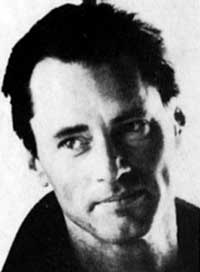|
Loading
|
|
|
 Extracts
from an interview with
Extracts
from an interview with
Sam Shepard
by Stephen Fay, published in The Sunday Times on 28 August 1984.
Sam Shepard was born in 1943, and after his father's service in the army air corps, the family settled in Southern California. The only thing Shepard positively enjoyed at school was animals, and when he left he worked as a ranch hand, getting to know horses...
Having identified particularly strongly with cowboys in the movies, he saw an advertisement for an actor with a group of travelling players who performed in churches. He auditioned and got the part. He then learnt that actors are more dependant on authors and directors than he liked and... began to write rather than act. "It was as though somebody was stuck somewhere and had nothing to do but whittle on a piece of wood, and all of a sudden discovered he could make sculpture."... In the late sixties he worked in clubs and played drums in a rock band... and in 1971 he came to London. Why London? "I wanted to go somewhere where they spoke English."
He had not been quite so feckless in New York as his verbal autobiography suggests. He had worked on film scripts and come away with some foundation money. In London he went to live in Shepherd's Bush and looked for work with another band. Meanwhile, being a betting man still, he discovered greyhound racing at White City, and thought it the most exciting thing in London...
He finally found his way back to theatre. (In this period he probably made as much money out of the dogs as he did out of his plays, even though four were produced in London — at the Hampstead Theatre Club and the Royal Court, where he directed one of them himself. ) Tony Richardson, with whom he had already worked on a film script, had introduced Shepard to the Court, where he liked working with the actors: "Very willing to explore, much more so than American actors, who are paranoid about their technique." By 1974 Shepard was homesick. He had not stopped thinking about America simply because he had left it: distance began to lend enchantment. He started talking about the endless mystery of America and the music in the language, and to wonder why he was writing American plays in London. It was time to go home...
In his plays Shepard's characters shout a lot, and fight each other quite often. He admits it freely: his work is violent because it is about America ... "It's a tangible presence, you feel it every where in America. There's no need to be frightened of it. I find I can use it as a vehicle for other feelings." ... His plays set out to confront the audience with a view of America as a broken, fragmented, unhappy society...
When he returned to America in 1974, he went to live in northern California. His plays were performed at the Magic Theatre, San Francisco, and one of them — Buried Child — was so successful that it carried off the Pulitzer Prize in 1979. He was beginning to write autobiographical fragments that appeared later in a book, Motel Chronicles. He had rediscovered horses, and rode well enough to take part in small town rodeos.
In 1978 he first appeared on the screen. In the film Days of Heaven Shepard played a Texas rancher... Four years and four films later, he had been nominated for an Oscar as best film actor for his performance as the test pilot Chuck Yeager in The Right Stuff... "There's a certain voyeurism about the camera. With a live audience in the theatre, an actor has to meet total physical and emotional demands, while in a film you can use little pieces of yourself and that's construed as acting." ...
"I guess I'm always hoping for one play that will end my need to write plays. Sort of the definitive piece, but it never happens. There's always disappointment, something missing, some level that hasn't been touched, and the more you write the more you struggle, even if you are riding a wave of inspiration. And if the piece does touch something, you always know you haven't got to the depths of certain emotional territory. So you go out and try another one."
Plays:
- 1964
- Up to Thursday; Dog; Rocking Chair; Cowboys; The Rock Garden.
- 1965
- 4-H Club; Icarus's Mother; Chicago.
- 1966
- Red Cross; Fourteen Hundred Thousand.
- 1967
- La Turista; Melodrama Play; Forensic and the Navigators; Cowboys 2.
- 1969
- The Holy Ghostly; The Unseen Hand; Operation Sidewinder.
- 1970
- Shaved Splits.
- 1971
- Mad Dog Blues; Cowboy Mouth; Back Bog Beast Bait.
- 1972
- Tooth of Crime.
- 1973
- Blue Bitch.
- 1974
- Geography of a Horse Dreamer.
- 1975
- Action; Killer's Head.
- 1976
- Suicide in Bb.
- 1977
- Angel City; Curse of the Starving Class.
- 1978
- Seduced; Buried Child.
- 1979
- Tongues; Savage/Love.
- 1980
- True West.
- 1983
- Fool for Love.
Screenplays:
Zabriskie Point. Paris Texas.
Prose:
Rolling Thunder Log Book. Hawk Moon. Motel Chronicles.